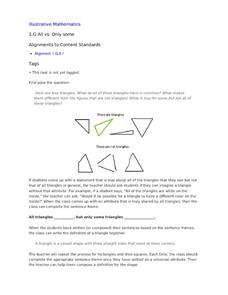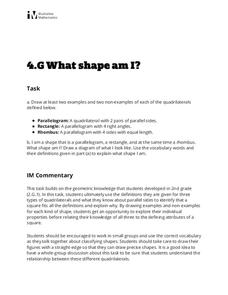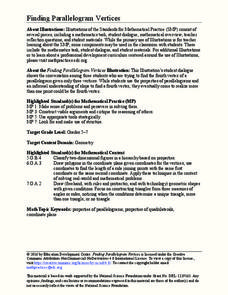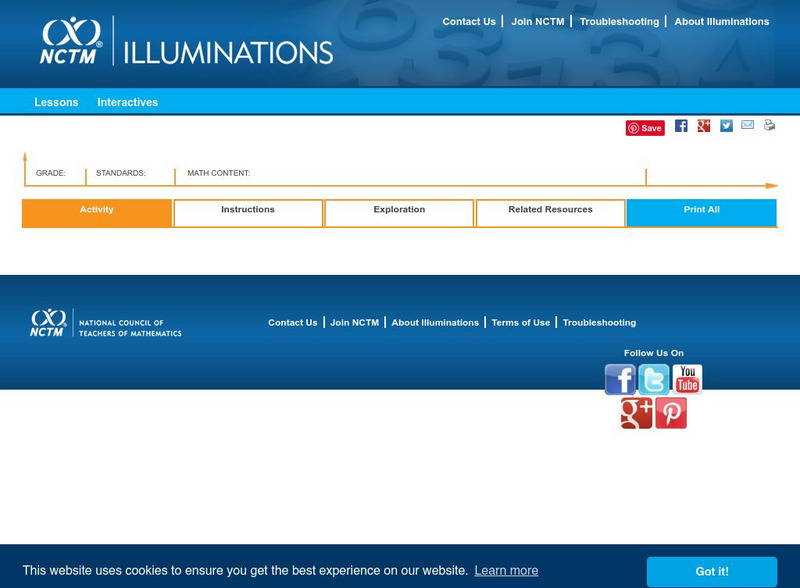Illustrative Mathematics
All vs. Only Some
All shapes have certain defining attributes that set them apart from others. In order to understand this, young mathematicians look at examples and non-examples of triangles, rectangles, and squares, working as a whole class to create...
Illustrative Mathematics
What Shape Am I?
Sharpen your pencil and grab a ruler, it's time to draw some quadrilaterals! Given the definition of a parallelogram, rectangle, and rhombus, learners draw examples and nonexamples of each figure. The three definitions are...
Illustrative Mathematics
What is a Trapezoid? (Part 2)
This collaborative activity investigates the meaning of a trapezoid and a parallelogram. It begins by presenting two different definitions of a trapezoid. Learners are to reason abstractly the difference between the two definitions and...
Illustrative Mathematics
Alike or Different Game
How are a circle and triangle alike? How are they different? These are the types of questions children will answer while playing this fun geometry game. Including a variety of conventional and unconventional shapes, this activity allows...
Noyce Foundation
Lyle's Triangles
Try five problems on triangles. Levels A and B focus on shapes that can be created from right triangles. Level C touches upon the relationship between the area of a six-pointed star and the area of each triangle of which it is composed....
Curated OER
Shapes and Their Insides
Learners follow a series of instructions for drawing and coloring different shapes in order to learn the difference between the perimeter and area of a polygon. Then they are asked to find the perimeter and area of a 3x4 rectangular...
Illustrative Mathematics
Counting Squares
Challenge young mathematicians' understanding of squares with this geometry puzzle. The task is simple, identify as many squares as possible in a 3x3 array. Allow learners to work independently or in pairs as they search for squares,...
Education Development Center
Finding Parallelogram Vertices
Four is the perfect number—if you're talking about parallelograms. Scholars determine a possible fourth vertex of a parallelogram in the coordinate plane given the coordinates of three vertices. They read a conversation...
Other
Gvsu: Quadrilateral Hunt
The learning activity asks students to identify quadrilaterals by characteristics rather than appearance. Learners drag the vertices of the shape to reveal the true shape of the quadrilateral. [Requires Java.]
Texas Instruments
Texas Instruments: Investigating Quadrilaterals
Students will create a variety of quadrilaterals using the GEOBOARD APP and identify critical attributes.
Illustrative Mathematics
Illustrative Mathematics: 4.g What Shape Am I?
In this task, students ultimately use the definitions they are given for three types of quadrilaterals and what they know about parallel sides to identify that a square fits all the definitions and explain why. Aligns with 4.G.A.2.
National Council of Teachers of Mathematics
Nctm: Illuminations: Cutting Corners
Students will use their knowledge of plane figure attributes to create and view shapes by cutting and rotating shapes to stimulate discussions on names and attributes of various shapes they do not regularly encounter.
Cut the Knot
Cut the Knot: Geoboard
Students can use the interactive geoboard to create different types of quadrilaterals and investigate the properties of quadrilaterals. Requires Java. The geoboard can also be downloaded for offline use.
Texas Instruments
Texas Instruments: Perimeters, Areas, and Slopes Oh, My!
In this activity, students create geometric figures, and use analytic and coordinate geometry to investigate their attributes. They go through the process of proving that a quadrilateral is a parallelogram.















